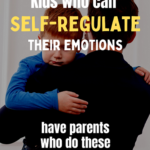As parents, we realize the significant value of communication in our children’s lives. The way we speak to children, listen to their voices, and participate in meaningful dialogues greatly impacts their development. In this thorough tutorial, we’ll dig into the realm of talking parents and examine techniques to boost communication with your children. Effective communication creates the framework for cultivating healthy relationships, building emotional intelligence, and encouraging lifelong learning.
The Power of Parental Communication
Before we get into the subtleties of communicating to your children, let’s reflect on why good communication means so much:
Building Trust
Open and honest communication develops trust between parents and children. When youngsters feel heard and understood, they are more willing to confide in their parents.
Emotional Well-being
Talking to youngsters about their emotions and worries helps them develop emotional intelligence. It helps individuals to express themselves and manage emotions appropriately.
Academic Success
Effective communication increases a child’s language abilities and cognitive development, leading to greater academic success.
Conflict Resolution
Teaching children how to communicate effectively empowers them with problem-solving skills, lowering disputes and boosting conflict resolution abilities.
Bonding and Connection
Meaningful talks develop deep relationships between parents and children. These ties are crucial for a child’s feeling of belonging and self-esteem.
Read also: From Stress to Success: The Benefits of a Parenting Class
Strategies for Talking Parents
Now that we realize the necessity of communication, let’s examine practical techniques to become talking parents:
- Active ListeningActive listening entails providing your entire attention when your kid talks. Put aside distractions, establish eye contact, and sincerely listen to what they are saying. Respond with empathy and without judgment.
- Encourage ExpressionCreate a secure atmosphere for your youngster to express themselves freely. Encourage them to discuss their ideas, emotions, and worries. Avoid interrupting or disregarding their feelings.
- Ask Open-Ended QuestionsEngage your youngster in conversation by asking open-ended inquiries. These questions need more than a simple “yes” or “no” response and push students to expound on their opinions.
- Be PatientChildren may take time to develop their views and communicate them. Practice patience and avoid hurrying them while they are attempting to communicate.
- Validate EmotionsLet your youngster know that their feelings are genuine, even if you don’t agree with them. Validating their sentiments helps them understand and regulate their emotions better.
- Empathize and Offer SupportShow empathy when your kid is distressed or experiencing obstacles. Offer assistance and let them know you are there for them. Sometimes, a listening ear is all they need.
- Model Effective CommunicationChildren learn through example. Model successful communication by displaying active listening, empathy, and courteous discussion in your encounters with others.
Conversations for Different Ages
Effective communication changes as children grow. Here are some guidelines for talking to children of various age groups:
Talking to Toddlers
- Use basic language and brief phrases.
- Encourage children to express themselves via gestures and words.
- Repeat and reinforce new words and ideas.
- Be patient while kids improve their verbal abilities.
Talking to School-Age Children
- Ask about their day and show interest in their hobbies.
- Encourage children to communicate their views and emotions.
- Discuss their interests and hobbies.
- Listen actively and give direction as required.
Talking to Teens
- Respect their demand for independence and solitude.
- Engage in talks about their aims and desires.
- Discuss more difficult themes, such as relationships, peer pressure, and future ambitions.
- Be an engaged listener without being judgemental.
Fostering Lifelong Learning
Effective communication not only enhances your child’s immediate well-being but also sets the scene for a lifetime of learning and development. By cultivating open and honest discussion, you encourage your children to explore their environment, make educated choices, and establish healthy connections. Remember that communication is a talent that develops through time, and as talking parents, we play a critical part in molding our children’s communication skills.
In conclusion, talking parents realize the transforming potential of communication in their children’s lives. By following these tactics and cultivating a culture of open discussion, we can steer our children toward emotional intelligence, academic achievement, and good relationships. Let’s embrace our position as talking parents and lay the route for our children’s bright and communicative future.





